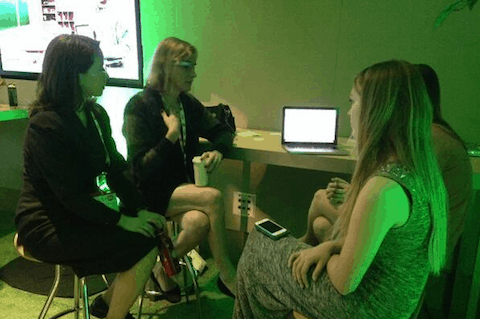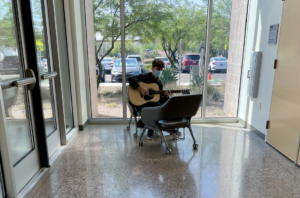The Future of Personalized Learning

By: Student Correspondent
Norma and Vivienne Ming envision a future world of education in which technology can respond to each student’s personal learning process. The technology the Mings are developing would allow teachers to know when their student are not understanding the material, as well as forcing students to learn for their own interest, rather than striving to achieve a certain grade. Students would attend class wearing a small microphone that would record their classroom interactions, and then analyze their understanding of the taught subject matter. Norma has used her background in teaching and psychology to establish what children are lacking in their education.
“Working with [high school students] got me to realize that I really need to learn more about how teaching works,” Norma said. “That inspired me to pursue my Ph.D in continuative psychology with the goal of teaching teachers how to teach better.”
Vivienne Ming has implemented her knowledge of neuroscience to incorporate the cognitive responses of students, and consequently study how students learn most effectively.
“My research is on brains and how they learn from their experience in the natural world,” Vivienne said.
Norma and Vivienne Ming’s goal to improve the education system quickly snowballed, especially after they began collaborate their ideas and insights. The two founded Socos, an educational technology and data mining company that effectively ‘grades’ students on performance based on their desire to strive for information and apply what they learn to their daily lives.
This technology is unique because it focuses on how the students learn. As the students develop, the technology develops with them. Artificial Intelligence systems (AI) are being tested at the University of Phoenix as well as in kindergarten classrooms.
“We can build an AI, without it being an AI,” Vivienne said. “Instead of it just being an expert system AI in biology, it becomes a machine learning intelligence about how students think about biology. This allows students to truly understand and master an idea.”
The Mings despise standardized testing- something with which we as students can empathize with. The idea that a student’s college admissions relies solely on exams that are so objective seem to be counterproductive. Studying for a test such as the SAT forces students to trap their brain into thinking in a specific way, which discourages students like us from being innovative and thinking outside of the box. The Mings’ idea, in theory, will eliminate the need to take any standardized tests, and instead will encourage students to break boundaries and discover unknowns.
“People who succeed from traditional system of learning are the people who are very good at following the rules,” Norma said. “Throughout their time in school they have been forced, literally, to check the right boxes in order to achieve success. And by doing that they have been robbed of the opportunity to motivate themselves, to self assess, and to figure out what their own path should be.
This statement could not describe our thoughts more perfectly. As high school juniors, standardized testing is an imposing force on our future education. We drag our feet as we study for a test in which we do not approve, rather than spending our time and energy focusing on things that actually appeal to our interest. The Mings’ technology provides an alternate form of education that allows students to strive to discover rather than to learn to take a test.
“In a test culture, the test takers win,” Norma said. “But we know from years of research that test takers don’t win. It’s the learners who win.”





